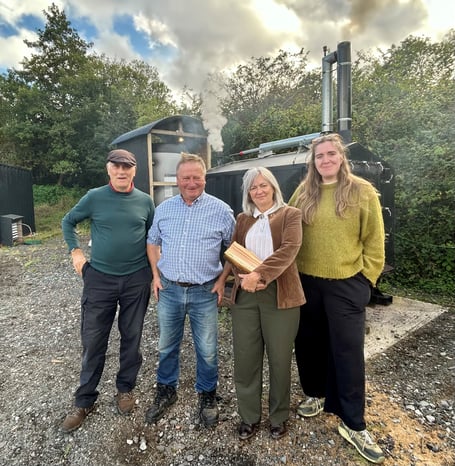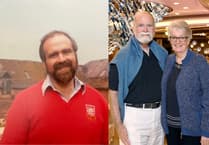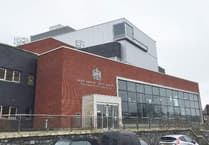An initiative being developed in Gwynedd could lead towards a greener future for some heritage steam railways and livestock farming.
MP Liz Saville Roberts visited Fferm Tynyclwt, at Dyffryn Ogwen, to meet Colin Keyse and see the Continuity Biocoal Project.
The chair of the All-Party Parliamentary Group on Heritage Rail went as part of Railway 200 campaign, a nationwide initiative marking the bicentenary of the birth of the modern railway that not only honours the legacy of rail but also looks to its future and innovation, sustainability and developing skills in the sector.
The Biochar and Continuity Biocoal Project was developed in collaboration with partners in Wales and Ireland.
It uses biomass-based fuel – such as torrefied olive stones and wood – to emulate the traditional use of coal.
The MP said: “The Biochar and Continuity Biocoal Project at Fferm Tynyclwt is a shining example of how we can honour our past while embracing a cleaner, greener future.
“Colin Keyse, has been instrumental in advancing the project locally, showcasING this material’s potential to transform both the heritage sector and traditional livestock farming.
“With traditional coal supplies dwindling and environmental pressures mounting, Biocoal offers a potential lifeline to heritage railways that want to keep steam services running.
“Projects like this show how Wales can lead the way in climate-conscious innovation.”
Colin Keyse added that whilst some Biocoal products made from 100 per cent waste biomass already existed in stoves and power generation, upgrading the fuel “to make it suitable for historic, moving machines presents greater challenges.
“Our own small on-farm plant is set up primarily to produce Biochar for local agricultural applications but uses the same well-understood process.
“We’ve had some success trialling imported Biocoal, and know what needs to be done next to improve it to be a viable low-carbon fuel for this small but very important part of Wales’ tourism industry.
“We have the jigsaw pieces and can see the big picture, we now need to put them together”.
Historian, writer and former National Railway Museum curator Bob Gwynne, who acts as an advisor on sustainability for the Llangollen Railway, has been following the developments. He has also presented on the subject to the Heritage Railway Association.
He said what Liz Saville Roberts had seen at Bethesda was “a baby step” along the road to a sustainable fuel for “some” heritage steam operations.
“Torrefied biomass has potential to be a substitute for coal in some operations – namely those which are relatively short without steep gradients.
“What the MP saw was the start of a project that could lead to a solution for some operations where the desire to move on from coal is great, and where the geography/standard operation of the line is right.
“As important, is the fact that torrefied biomass has huge potential in agriculture, helping to deliver clean water. A burnable carbon rich fuel is a potential side product from those important applications of this technology.
“Those in the heritage railway movement are well aware that an alternative to coal is worth exploring as the raw product is no longer available from UK mines.
“This makes it very much more expensive and often lower in quality to what was available, whilst making its carbon footprint worse.”
Though he noted that roads that parallel a heritage line “will almost certainly have a higher carbon footprint”.
He added: “Arguably, the supply chain for the small amount of coal that heritage lines use is also under threat, hence the search for a potential alternative with some products available now that use, in part, renewables.
“So far, torrefied biomass shows promise, though other railways are investigating using oil, common overseas, which can also be sourced in a renewable form (HVO). Oil also comes with no suggestion that the supply chain will ever be under threat.
“It is just possible that a solution to keeping Wales steaming could come from an alliance between a different approach to farming and the right technology”.
Gwynedd Councillor for Tregarth and Mynydd Llandygai Beca Roberts said the Fferm Tynyclwt scheme was “a fantastic example of how local innovation can have national impact”.
“I’m particularly excited by the wider potential of Biocoal – not just for railways, but for agriculture and livestock farming.”





Comments
This article has no comments yet. Be the first to leave a comment.